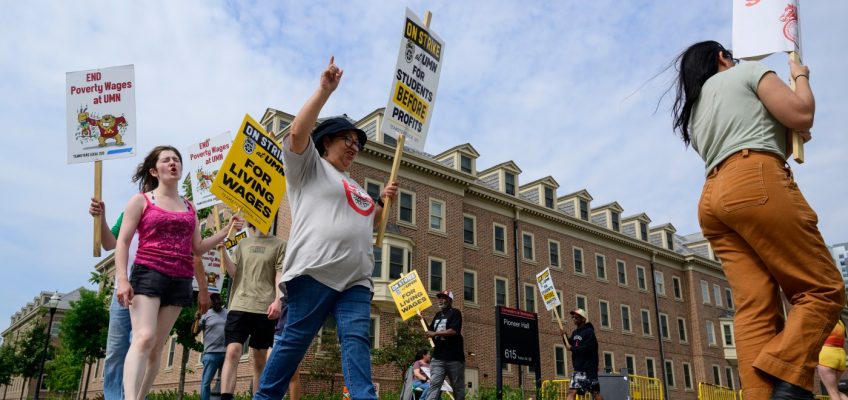After a week on strike, the University of Minnesota and Teamsters Local 320 have reached a tentative agreement.
The Teamsters announced on Facebook that their negotiating team has a tentative agreement for members to vote on, ending the strike and allowing next week’s Farm Aid concert to continue as planned.
“The strike is over!” the post said.
Members of Teamsters Local 320, which represents 1,400 custodial, food service, maintenance and sanitation workers on campuses around the state, went on strike Monday night at the Crookston and Morris campuses and expanded to Duluth and satellite campuses Tuesday morning. Workers at the Twin Cities campus joined the strike Tuesday night.
The union’s current contract expired June 30, and negotiations have been ongoing since late March. Union members filed an intent to strike Aug. 7, with initial plans for the strike to begin Aug. 20, just as students were returning to the Duluth campus.
The university put forth a new contract — its last, best and final offer — on Aug. 19, and the strike was put on hold so workers could consider the contract. With an 82% majority, union members voted to reject the offer, citing frustrations over annual wage increases and changes to the contract’s expiration date.
Farm Aid
The Farm Aid organization said on X that their September 20 concert will go on as planned. The concert had been jeopardized by the strike and organizers considered finding a new venue at the last minute.
Farm Aid staff were set to begin building the stage Friday for the concert featuring Willie Nelson, Neil Young, John Mellencamp, Dave Matthews and a dozen other musical acts, but organizers released a statement Thursday that said: “Our artists, production team and partners have made clear that they will not cross a picket line.”
Just after midnight on Saturday, the organization said on X: “Farm Aid is grateful that the University of Minnesota and Teamsters Local 320 have reached an agreement. We are thrilled to confirm that Farm Aid 40 will go forward in Minneapolis as planned.
“For four decades, Farm Aid has stood with farmers and workers. Today’s agreement is a reminder of what can be achieved when people come together in the spirit of fairness and solidarity.”
Related Articles
Charlie Kirk/Michael Knowles Sept. 22 event at U still listed on schedule
Farm Aid considering new venue amid Teamsters strike at UMN
University of Minnesota service workers strike on campuses across state
UMN service workers poised to begin striking over labor contract
Twin Cities mom wants to help you have ‘The Talk’ with your kids




